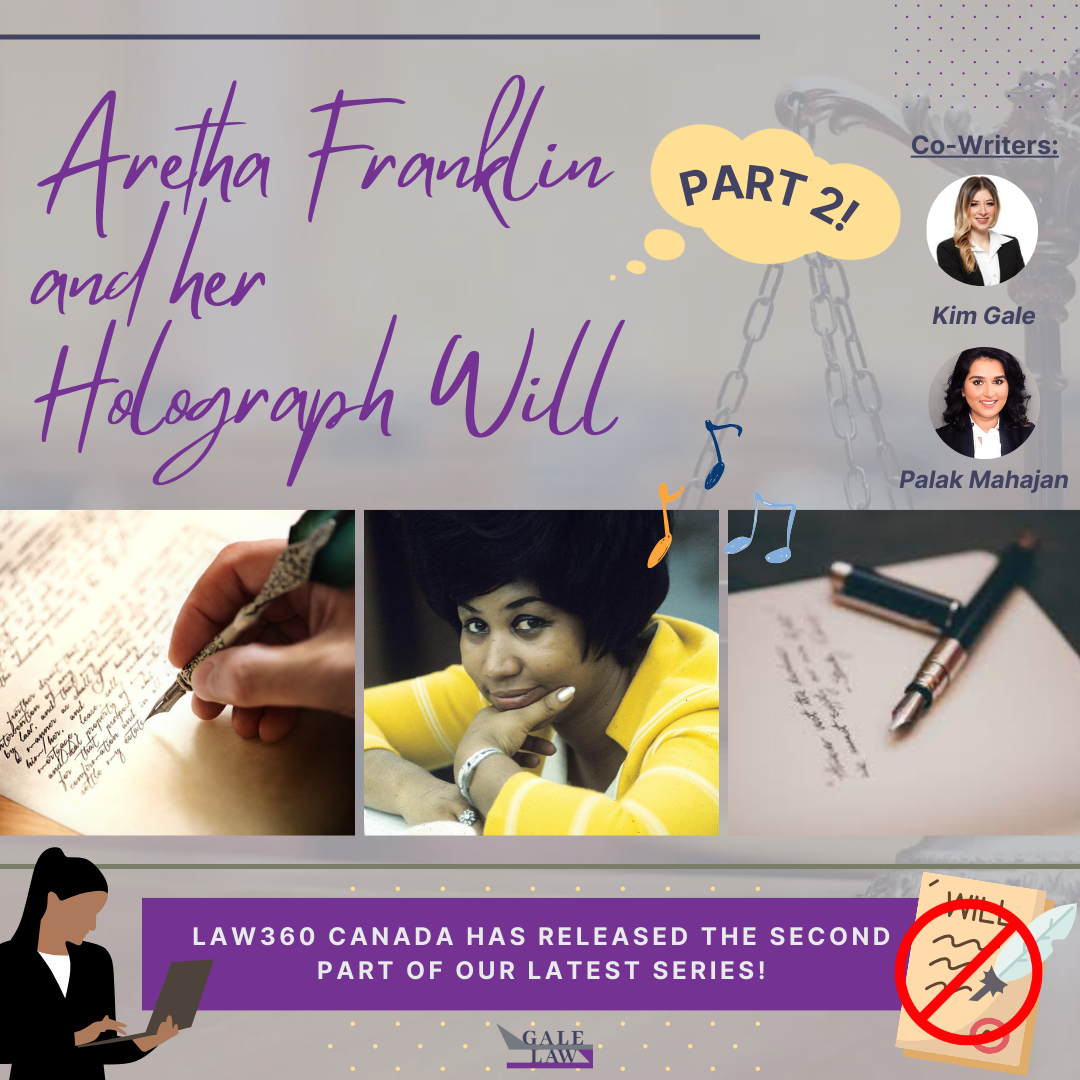
Co-written by: Kim Gale and Palak Mahajan
As we discussed in the first article in this two-part series, the singer Aretha Franklin passed away in 2018.
During the search of her home, her designated personal representative found two different handwritten wills. One was in a notebook under a couch cushion and was dated 2014 (the "2014 will"). The other will was in a locked cabinet and was dated 2010 (the "2010 will").
A six-person jury deemed the 2014 will worthy of "respect," rejecting the contention that the 2010 will ought to be valid as it was notarized.
Holograph Wills
A holographic will is a handwritten will which is curated by the testator by hand wholly in their handwriting. A computer, typewriter, and/or phone are not used, meaning partially handwritten, such as fill-in-the blank forms, don't meet the requirements of a holograph will.
Section 6 of Ontario's Succession Law Reform Act (SLRA), details holograph wills. The provision stipulates that a testator may make a valid will wholly by his or her own handwriting and signature, without formality, and without the presence, attestation, or signature of a witness.
While this provision does away with many of the formalities of execution, not every handwritten note before death is a valid will.
For a holographic will to be considered valid, it must reflect itself as a testamentary document, which entails that it must demonstrate the donor's "deliberate or fixed and final expression of intention" to make a gift that is effective only at the donor's death and is revocable until then.
In Ontario, it is possible to make a valid will entirely in one's own handwriting. Such a will require no witnesses or other formalities of execution. However, it is important that the holographic will is signed by the testator.
Ontario: When a Holograph Will is Valid
The Superior Court of Ontario in the case of McKenzie v. Hill, 2022 ONSC 4881 considered the factors that are relevant in determining if a document can be construed as a valid will or not.
The first factor that was considered was the language of the document. It was deliberated that in all or some aspects, the document read like a will.
The second factor considered was the evidence of the applicant pertaining to the nature of the document. It was claimed that the document intended to leave the condo and property to the application upon the death of the testator.
The last and most crucial factor considered was whether the document was indicative of the deceased's intention that the property should be disposed to the application upon the deceased's death. To this, the court laid down further two principles of law:
- The court should keep in mind that the deceased was not a lawyer as such, courts should attempt to read the document generously and to ascribe plain and ordinary meaning to the words of the testator.
- The intention that the disposition is to be triggered upon the deceased's death need not be explicit and can be evaluated from other circumstances.
To sum it up, the three factors considered by the courts are:
- language of the document;
- evidence provided supporting the nature of the document; and
- intention of the testator from the
Additionally, Canadian case law is clear that the handwritten portion must, standing on its own (without any interpretive aid or context that might be provided by the pre-printed portions of the document), reflect its author's intention to have dispositive effect. Where a holograph will refers to a typewritten document, the typewritten portion will not be admitted into probate.
Was Franklin's will substantially compliant?
There have been instances before the Canadian courts where testamentary intentions scratched on the fender of a tractor have been construed to be a valid will. The court of Saskatchewan in the case of Cecil George Harris in the year 1948 upheld the writing on the tractor as a holographic will which states "In case I die in this mess, I leave all to the wife, Cecil Geo. Harris."
Ontario is a jurisdiction of testamentary freedom, which protects a testator's right to unconditionally dispose of his or her property, and to choose beneficiaries as he or she wishes.
The law relating to the validity of holographic wills in Michigan appears similar to that of Ontario. As Franklin's will demonstrates her deliberate or fixed and final expression of intention relating to the disposition of her assets, the 2014 will would have likely been valid in Ontario also as it seems to fulfil the "substantial compliance" requirement under the SLRA.
There appears to be an intention on the part of the legislature and courts to assist people with unusual problems. Franklin's 2014 will found in a couch cushion poses one such problem. However, courts in Ontario would have likely followed the spirit of the legislature and considered the 2014 will as a valid will, similar to the Michigan jury.
This article was originally published by Law360 Canada part of LexisNexis Canada Inc.
